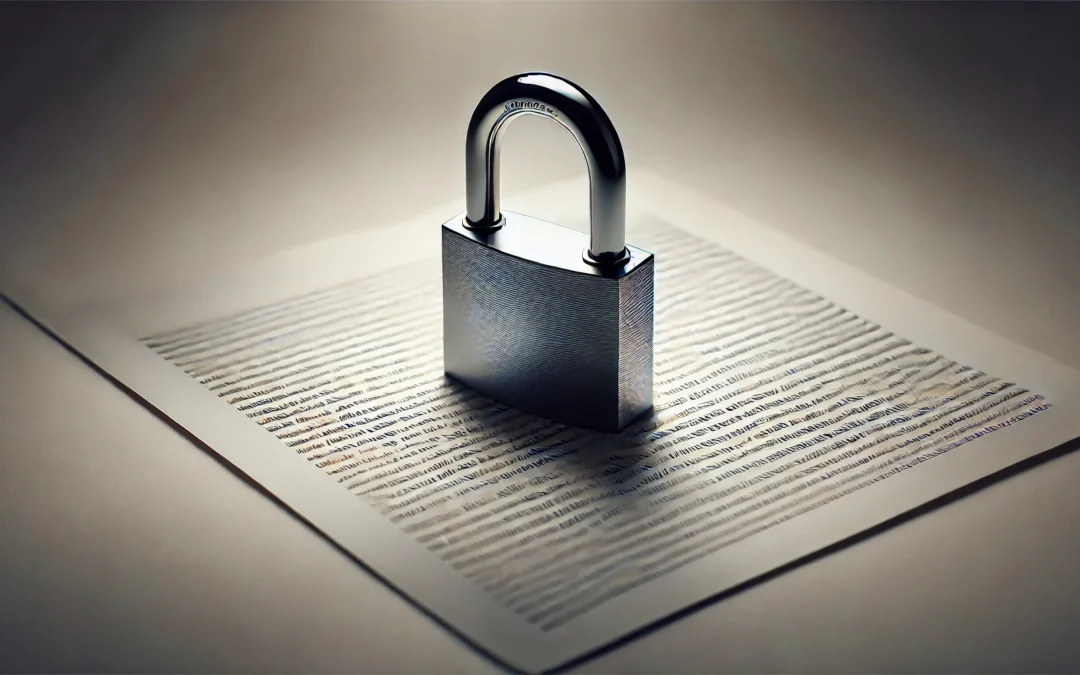Confidentiality is a key part of how we protect personal and sensitive information in our daily lives. Whether at work, in healthcare, or online, ensuring that private details stay private is crucial. When we talk about confidentiality, we are referring to the practice of keeping information secure and only sharing it with those who are authorized to know. This practice helps maintain trust and integrity in many settings, from businesses to personal relationships.
In this article, we’re going to explore 20 examples of confidentiality to show how it plays a role in different areas. You’ll see how confidentiality is important not just for big organizations but also for individuals. By understanding these examples, you’ll get a better sense of how confidentiality works and why it’s so important. From keeping medical records secure to ensuring private conversations remain private, confidentiality touches many aspects of our lives. Let’s dive in and take a closer look at these examples to understand how we can all better protect sensitive information.
What is Confidentiality?
Confidentiality means keeping sensitive information private and ensuring that it is only accessed by those who are authorized. It is an important practice in areas like healthcare, law, business, and everyday life, helping to protect personal details, private conversations, and important business data. Confidentiality is upheld through clear rules and methods, such as locking up files, using passwords, and restricting who can see or use certain information. In today’s digital world, this also includes things like encrypting data, setting up secure passwords, and using safe communication methods to keep information safe from hackers. Protecting confidentiality is essential for building trust, following legal rules, and avoiding damage, such as data leaks or financial losses.
The Most Important Examples of Confidentiality
Confidentiality is a crucial part of many aspects of life. Whether in healthcare, law, or everyday conversations, protecting private information is essential to building trust and ensuring safety. Below are 20 key examples of confidentiality that highlight how it plays a role in different settings, helping to safeguard sensitive information and maintain privacy.
1. Medical Records
Medical records are one of the most sensitive types of information. They contain details about a patient’s health, treatments, diagnoses, and medications. Only authorized medical professionals – such as doctors, nurses, and relevant healthcare staff – should have access to these records. Patients also have a right to their own records, but beyond that, confidentiality must be strictly maintained. For example, without consent, a doctor cannot share your medical history with an employer or insurance company. This protection ensures that private health information is not exposed, reducing the risk of discrimination or misuse.
2. Legal Advice
When clients share personal, financial, or criminal information with their lawyers, it’s done under the assumption of strict confidentiality. Lawyers are ethically bound to keep this information private, allowing clients to be fully honest without fear of exposure. This is known as “attorney-client privilege.” A breach of this confidentiality could not only damage the client’s case but could also result in legal penalties for the lawyer, and in some cases, the information may no longer be protected in court.
3. Employee Information
Employers hold a significant amount of personal data on their employees, including contact details, social security numbers, and bank account information. This information is necessary for payroll and benefits but must be carefully guarded to prevent identity theft or fraud. Employers must ensure that only authorized personnel can access such sensitive data, and it should be stored in a secure system with encryption and proper access controls.
4. Student Records
Schools and educational institutions store a wealth of information on their students, from grades and disciplinary records to personal information like addresses and health details. By keeping this information confidential, schools ensure that students’ personal lives and academic performances are protected. Only authorized individuals, such as parents, teachers, and school administrators, should have access to these records, with strict rules around how they can be shared.
5. Financial Data
Financial institutions, like banks, manage a wide range of sensitive customer data, including account balances, transaction histories, and loan details. This information must be closely guarded to prevent unauthorized access, which could lead to financial fraud or identity theft. Confidentiality in this context often involves the use of encryption, two-factor authentication, and secure online banking systems to protect clients’ financial well-being.
6. Business Trade Secrets
Companies often develop products, strategies, or processes that give them a unique advantage in the marketplace. These “trade secrets” are highly confidential, and if exposed, could be used by competitors to undermine the company’s position. For example, a secret recipe, manufacturing method, or business strategy should be protected through non-disclosure agreements (NDAs) with employees or partners to ensure that it remains confidential.
7. Client-Auditor Confidentiality
Auditors are given access to a company’s detailed financial information to ensure the accuracy of their financial statements. It’s critical that auditors maintain strict confidentiality regarding this information. If an auditor were to reveal sensitive financial data, it could affect the company’s market value or give competitors an unfair advantage. Auditors must follow ethical standards to ensure the integrity and trust of the auditing process.
8. Confidential Informants
In law enforcement, the identity of confidential informants is closely guarded. These individuals often provide crucial information about criminal activities, and their safety depends on remaining anonymous. If their identity is disclosed, it could compromise ongoing investigations or even put their lives in danger. Law enforcement agencies have strict protocols to protect informant confidentiality at all costs.
9. Online Passwords
Passwords are a basic yet essential form of confidentiality. They protect access to personal accounts, email, social media, banking, and more. Storing passwords securely and using complex, unique passwords for different accounts is crucial for keeping sensitive information confidential. Many people now use password managers or two-factor authentication to further secure their online accounts and prevent hacking attempts.
10. Research Data
When conducting research, participants often provide personal or sensitive information. Whether it’s in the context of medical studies, social sciences, or market research, participants trust that their data will remain confidential. Researchers must ensure this by anonymizing data and limiting access to it. Breaching this confidentiality could not only damage the integrity of the study but also harm the individuals involved. Maintaining data confidentiality is a key part of ethical research practices.
11. Journalistic Sources
Journalists often rely on confidential sources to uncover vital stories. These sources may be whistleblowers or individuals providing sensitive information under the condition that their identity remains protected. By keeping their sources confidential, journalists can help expose corruption or wrongdoing without putting their sources at risk of retaliation. This protection ensures the flow of crucial information while maintaining the safety and trust of those involved.
12. Government Secrets
Confidentiality in government is critical to national security. Governments handle classified information that could endanger the country’s safety, economy, or international relationships if leaked. For example, military strategies, intelligence operations, and diplomatic negotiations are often kept secret. Unauthorized disclosure, such as a data breach or whistleblowing of sensitive materials, can lead to severe consequences, including compromising national security or endangering lives.
13. Patient-Doctor Conversations
The trust between a doctor and a patient is rooted in confidentiality. When patients discuss personal health issues with their doctors, they expect those conversations to remain private. This allows patients to be honest about their symptoms, fears, or lifestyle choices, which are critical for accurate diagnoses and effective treatments. If this confidentiality is broken, it can damage the patient-doctor relationship and even prevent the patient from seeking care in the future.
14. Confidential Surveys
Organizations, businesses, and researchers often rely on confidential surveys to collect honest feedback or data. When people know their responses won’t be traced back to them, they are more likely to provide truthful answers. For instance, an employee satisfaction survey that promises confidentiality is more likely to reveal genuine concerns. This enables the organization to address issues and make improvements, all while protecting the identities of those who participated.
15. Intellectual Property
Before an inventor files for a patent, their ideas need to remain confidential. Sharing these ideas prematurely could lead to someone else claiming the invention. For example, if a new technological innovation or product concept leaks, competitors could replicate or even steal the idea before the original inventor can secure rights. Therefore, non-disclosure agreements (NDAs) are often used to protect these innovations during early-stage development or discussions with potential partners.
16. Military Operations
The confidentiality of military operations is paramount for national security and the safety of personnel. Information about upcoming missions, troop movements, or military strategies must be kept classified to avoid tipping off adversaries. A breach of this confidentiality can endanger soldiers’ lives and compromise the success of operations. Military personnel are often trained to handle classified information with the utmost care to maintain security.
17. Therapy Sessions
Therapists provide a safe and private space for individuals to discuss personal problems or emotional struggles. Confidentiality is a core part of this relationship, ensuring that what is said in therapy stays in therapy. This protection allows clients to speak freely about deeply personal issues without fear of judgment or exposure. Breaking confidentiality in therapy can cause emotional harm and breach the trust that is essential for the therapeutic process to work.
18. Boardroom Discussions
In the business world, boardroom discussions about mergers, acquisitions, or future strategies are often kept confidential. Leaking this information could affect stock prices, give competitors an unfair advantage, or even lead to legal trouble. For example, if a company’s plan to merge with another leaks prematurely, it could cause speculation in the market and undermine the deal. That’s why these discussions are typically kept under strict confidentiality until the right time to disclose them.
19. Job Applicant Information
When someone applies for a job, they share sensitive personal information, including their work history, references, and sometimes even their current salary or medical information. Recruiters and hiring managers must protect this information to prevent misuse or identity theft. Confidentiality also ensures that applicants can trust the company with their private data, which is crucial for attracting talent and maintaining a company’s reputation.
20. Personal Conversations
In everyday life, we share private thoughts, feelings, and experiences with friends or family members, expecting them to keep our conversations confidential. Whether it’s a friend confiding about a personal problem or a family member sharing sensitive information, respecting this confidentiality is key to maintaining trust and close relationships. If someone shares these details without permission, it can lead to hurt feelings, damaged trust, and strained relationships.
Understanding the Importance of Confidentiality in Business
Confidentiality in business is crucial for maintaining trust and safeguarding sensitive information. In the corporate world, companies handle a plethora of confidential data ranging from trade secrets and business strategies to customer information and financial records. Protecting this information is vital for several reasons. Firstly, it helps in maintaining a competitive edge. If trade secrets or proprietary information were to be leaked, competitors could use that information to gain an advantage. Secondly, confidentiality builds trust with clients and customers. When companies assure clients that their personal and financial data are safe, it fosters loyalty and a positive reputation. Moreover, respecting confidentiality is often a legal obligation, with various regulations such as GDPR and HIPAA in place to ensure businesses protect personal data. Failing to comply can result in heavy fines and legal repercussions. Thus, implementing robust confidentiality practices is not just about protecting business interests but also about adhering to legal standards and maintaining customer trust.
The Biggest Challenges of Confidentiality in the Modern World
In today’s digital world, confidentiality faces more challenges than ever before. One of the biggest issues is the rise of cyber threats. With so much information stored online, hackers and cybercriminals have more opportunities to steal sensitive data. Businesses, governments, and individuals are all targets. From large-scale data breaches to phishing scams, keeping information secure is increasingly difficult.
Another challenge is balancing transparency with privacy. In sectors like healthcare, law, and government, there’s constant pressure to share information for collaboration, innovation, or accountability. Yet, too much sharing can lead to breaches of confidentiality, causing harm to individuals or organizations. Finding the right balance is an ongoing struggle.
Lastly, the sheer volume of digital communication makes maintaining confidentiality more complex. With the explosion of emails, messaging apps, and social media, sensitive information is being exchanged at a rapid pace. It’s harder to ensure that this data remains protected, especially with people working remotely or using unsecured networks. In this environment, the risk of accidental exposure or unauthorized access is higher than ever.
Confidentiality in Digital Communications
In today’s digital world, confidentiality in digital communications is more important than ever. With the rise of email, instant messaging, and video calls, sensitive information is constantly being exchanged online. Ensuring this information remains confidential is crucial. Encryption plays a key role here. It protects data by converting it into a code to prevent unauthorized access. Many messaging apps now use end-to-end encryption to ensure that only the sender and recipient can read the messages.
Another aspect to consider is the use of secure networks. Public Wi-Fi networks can be risky because they are often not encrypted, making it easy for hackers to intercept data. Using a Virtual Private Network (VPN) can provide an additional layer of security. It encrypts your internet connection, keeping your communications private.
Digital signatures are also important. They verify the identity of the sender and ensure the message hasn’t been altered. This helps maintain the integrity and confidentiality of the communication. Implementing these practices can significantly enhance confidentiality in digital interactions. Always be aware of the digital footprint you leave behind.
Confidentiality in Healthcare Settings
Confidentiality in healthcare is vital to maintain trust between patients and healthcare providers. Patients share personal and sensitive information with their doctors. They need assurance that this information will remain confidential. The Health Insurance Portability and Accountability Act (HIPAA) in the U.S. sets standards for protecting patient information. It requires healthcare providers to implement safeguards to ensure patient data is not disclosed without consent.
Electronic Health Records (EHRs) have made it easier to store and access patient information. However, they also pose a risk to confidentiality. Healthcare organizations must implement robust security measures to protect these records from unauthorized access. This includes using strong passwords, access controls, and regular audits.
Patient confidentiality extends beyond just keeping records safe. It also involves how healthcare providers communicate with patients. Discussions about a patient’s condition should occur in private settings to prevent eavesdropping. Staff should be trained on the importance of confidentiality and the procedures to maintain it. Maintaining confidentiality in healthcare is not just a legal requirement but a moral obligation. It is essential for delivering quality care and building trust.
Read also: Top 30 Stealing Examples & Definition
The Most Popular on BitGlint

Top 100 Personal Items List
Everyone uses personal items in their daily lives, often without even thinking about them. From the moment you wake up...

30 Defiance Examples & Meaning
Defiance is something most people experience at some point in life. You feel it when you say no to something that...

Top 30 Desire Examples & Definition
Desire is a powerful force that drives much of human behavior, shaping our goals, dreams, and everyday decisions. It's...

100 Non-Digital Things List
In everyday life, there are still hundreds of objects, tools, and materials that exist completely outside the digital...

30 Examples of Attention & Definition
Have you ever noticed how a catchy tune can grab your attention, even when you're busy doing something else? It's...

60 Cultural Traditions Examples & Definition
Cultural traditions are part of daily life - whether people realize it or not. They shape what we eat, how we...

Top 30 Intimacy Examples & Meaning
Intimacy goes beyond physical touch or romantic moments. It’s about closeness, trust, and connection. In everyday...
Get Inspired with BitGlint
The Latest
40 Emotional Value Examples & Meaning
Why do some messages stick — while others are forgotten? Why do people choose one brand over another, even when the product is the same? The answer often comes down to emotional value. Emotional value is what makes a message feel human. It’s the emotional connection...

30 Teasing Examples & Definition
Teasing is a common part of human interaction. People tease in different ways, for different reasons. Sometimes it is friendly. Sometimes it can hurt feelings. Understanding what teasing means and seeing clear examples helps everyone handle these moments better....
40 Thought Experiments for Curious Minds
Some questions can’t be answered with a simple yes or no. Some problems don’t have a clear solution. That’s where thought experiments come in. They aren’t just old ideas from philosophy books. Thought experiments are tools we still use to think through problems, test...
30 Examples of Harmony in Life
Have you ever listened to an orchestra and felt the music wash over you, each instrument blending perfectly with the others? That's harmony in action. It's not just about music, though. Harmony can be found in everyday life, from the way colors complement each other...

